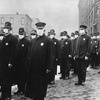Applied History in the Netherlands and Flanders
Synergising Practices in Education, Research, and Society
DOI:
https://doi.org/10.51769/bmgn-lchr.7117Keywords:
applied history, public history, history education, historical method, citizen scienceAbstract
This contribution shifts the debate on ‘applied history’ from the archetypal question abouts terminology and definition (‘what’s in a name’) to its current context and potential (‘why it is here again, and why it is most probably here to stay’). Those advocating ‘applied history’ in the Netherlands and Flanders by and large agree on a shared endeavour to apply both historical skills and insights to contemporary societal debates. They thereby tend to promote long-term, comparative and out-of-the-box thinking to confront today’s (wicked) problems. In these endeavours they offer an alternative to writing commissioned histories and commercial joint ventures, as well as to the 'public history' initiatives co-created by heritage institutions, museums or media outlets. Changing constellations of ideas and incentives in education, science, and society have certainly helped to create an incubation period for the development of applied history. History curricula now allow students to experience their added value in the workplace, research programmes ask to reflect upon the impact and valorisation of historical research, and most of all, younger generations are eager to merge postmodern approaches with clear societal achievements and are trying to do so on safe ethical and methodological grounds. This contribution argues that applied and fundamental research in the field of history could be mutually beneficial, rather than antithetical or antipathetic, and that both approaches can reinforce each other in future.
Deze bijdrage verschuift het debat over ‘toegepaste geschiedenis’ van de archetypische vragen over terminologie en definities (‘what’s in a name?’) naar zijn huidige context en potentieel (‘waarom is het opnieuw hier en waarom zal het hoogstwaarschijnlijk blijven?’). In Nederland en Vlaanderen zijn voorstanders van toegepaste geschiedenis het grotendeels eens over een gezamenlijk streven om zowel historische vaardigheden als inzichten toe te passen op maatschappelijke debatten. Daarbij hebben ze de neiging om langetermijn-, vergelijkend en ‘out-of-the-box’ denken te bevorderen bij de aanpak van hedendaagse complexe problemen. Zo bieden ze niet alleen een alternatief voor commerciële samenwerkingsverbanden of het schrijven van geschiedenisboeken in opdracht, maar ook voor publiekshistorische initiatieven die mede zijn opgezet door erfgoedinstellingen, musea of mediakanalen. Veranderende opvattingen in onderwijs, wetenschap en samenleving hebben bijgedragen aan deze ontwikkeling van toegepaste geschiedenis. Geschiedeniscurricula laten studenten tegenwoordig hun toegevoegde waarde direct op de werkplek ervaren via stages, terwijl onderzoeksprogramma’s vragen om na te denken over de impact en valorisatie van historisch onderzoek. Vooral jongere historici combineren al een postmoderne benadering met concrete maatschappelijke verwezenlijkingen en proberen dat te doen op een ethische en methodologisch verantwoorde manier. Deze bijdrage stelt dat toegepast en fundamenteel historisch onderzoek voor beide deelgebieden voordelig zou kunnen zijn, in plaats van antithetisch of antipathiek, en dat beide benaderingen elkaar in de toekomst kunnen versterken.
Actualiteitsparagraaf
Toegepaste geschiedenis
Waarom historici steeds meer over ‘vandaag’ spreken
Kun je iets uit het verleden leren? Het is een stokoude vraag die steeds meer historici in Nederland en België zich opnieuw stellen. Onder invloed van maatschappelijke vraagstukken zoals corona, klimaatverandering, diversiteit en (geo)politieke instabiliteit, maar ook door veranderende eisen van studenten en onderzoeksfinanciers, vinden historici het in toenemende mate belangrijk om na te denken over de ‘toegepaste waarde’ van historische kennis en expertise. In hun bijdrage voor BMGN 136:4 bespreken Violet Soen en Bram De Ridder hoe dergelijke ‘toegepaste geschiedenis’ aan een opmars bezig is en benadrukken ze het veelzijdige karakter daarvan. Ze beargumenteren dat toegepaste geschiedenis niet iets radicaal nieuw is maar eigenlijk al langer ingebed zit in de praktijk van veel historici. Tegelijk is het van groot belang om deze activiteiten een nieuwe methodologische en ethische basis te geven en om een constructieve dialoog te houden met historici die ‘vroeger’ vooral vroeger willen laten zijn. Kan je iets leren uit het verleden? Soen en De Ridder menen van wel, maar enkel als historici en hun maatschappelijke partners voldoende hard nadenken over het hoe en wat van toegepaste geschiedenis.
Downloads

Published
Issue
Section
License
Copyright (c) 2021 Violet Soen, Bram De Ridder

This work is licensed under a Creative Commons Attribution 4.0 International License.
Authors who publish with this journal agree to the following terms:
a) Authors retain copyright and grant the journal right of first publication with the work simultaneously licensed under a Creative Commons Attribution 4.0 International (CC BY 4.0) that allows others to share the work with an acknowledgement of the work's authorship and initial publication in this journal.
b) Authors are able to enter into separate, additional contractual arrangements for the non-exclusive distribution of the journal's published version of the work (e.g., post it to an institutional repository or publish it in a book), with an acknowledgement of its initial publication in this journal.
c) Authors are permitted to post their work online (e.g., in institutional repositories or on their website) prior to and during the submission process.
Authors are explicitly encouraged to deposit their published article in their institutional repository.








